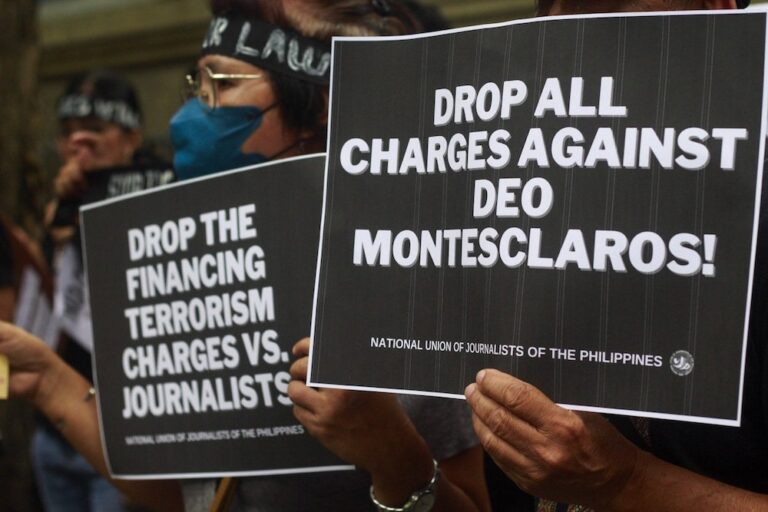(RSF/IFEX) – On 11 April 2002, RSF expressed indignation at the 5 April murder of a young Filipino journalist and human rights activist, Benjaline “Beng” Hernandez, on the island of Mindanao. RSF called on the Philippine government to “end the abuses and violence by the security forces committed against civilians in the course of anti-terrorist […]
(RSF/IFEX) – On 11 April 2002, RSF expressed indignation at the 5 April murder of a young Filipino journalist and human rights activist, Benjaline “Beng” Hernandez, on the island of Mindanao. RSF called on the Philippine government to “end the abuses and violence by the security forces committed against civilians in the course of anti-terrorist operations.”
RSF Secretary-General Robert Ménard said in a letter to Philippine President Gloria Macapagal-Arroyo that the killing showed that Mindanao “remains one of the most dangerous places in the world for journalists and defenders of human rights.” He called on the president to launch a “serious and thorough investigation” into the murder and to find and punish those responsible.
RSF learned that Hernandez, who worked for university student publications and was a researcher with the Karapatan human rights organisation in Davao (Mindanao island), was killed on 5 April while investigating implementation of the peace process in the Arakan Valley, in Cotabato province. The 22-year-old journalist was reportedly shot dead along with three local young people by soldiers of the Philippine army’s 12th Special Forces Company and the 7th Airborne Battalion, led by Sergeant Antonio Torella.
The official autopsy showed that Hernandez and the three others (Crisanto Amora, Vivian Andrade and Labaon Sinunday) were killed at close range. Hernandez had been shot in the head, neck, chest and hand. The army said the four were caught in crossfire between troops and rebels, but Hernandez’s friends said she was wounded and then executed by the soldiers.
The secretary-general of Karapatan in Davao, Joel Virador, told RSF that his organisation would send a fact-finding team to the scene. The local branch of the Human Rights Commission said it would also investigate the incident. The Cotabato provincial prosecutor plans to make an official enquiry.
Hernandez, who previously ran the student newspaper “Atenews” at Ateneo University in Davao, had recently joined Karapatan. She continued writing for university publications in the region and was vice-president for Mindanao of the Philippines College Editors’ Guild. She will be buried in Davao on 13 April.
Karapatan said three of its employees had been killed since President Macapagal-Arroyo took office in January 2001. In all, twenty-eight members of human rights and civil society groups have been killed during the same period.
Between November 2000 and May 2001, three journalists were killed on Mindanao. Candelario “Jun” Cayona, an announcer on the radio station dxLL, was murdered after receiving anonymous death threats from people who objected to his regular interviews with leaders of the Abu Sayyaf guerrilla movement (see IFEX alerts of 8 and 1 June and 31 May 2001).


